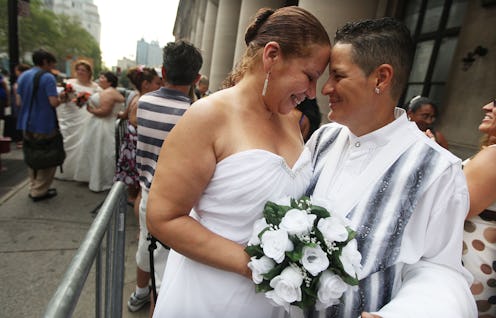News
A Four-State Blow To Gay Rights
Same-sex marriage got a big boost last month when the Supreme Court chose not to take up cases on the constitutionality of gay marriage bans. As a result, more than a dozen states officially legalized same-sex marriage, bringing the total number of states recognizing same-sex couples to 32. But that moment may have already come and gone: On Thursday, a federal appeals court upheld same-sex marriage bans in four states — Michigan, Kentucky, Ohio and Tennessee. It's the first major blow to gay marriage in 2014, but that doesn't mean the fight is over in these states just yet.
The U.S. Court of Appeals for the 6th Circuit handed down a 2-1 decision that reverses rulings from federal district courts, which struck down the same-sex marriage bans in those four states as unconstitutional. The Republican-appointed Judge Jeffrey Sutton wrote the 42-page decision, arguing that the courts shouldn't be deciding social issues:
When the courts do not let the people resolve new social issues like this one, they perpetuate the idea that the heroes in these change events are judges and lawyers. Better in this instance, we think, to allow change through the customary political processes, in which the people, gay and straight alike, become the heroes of their own stories by meeting each other not as adversaries in a court system but as fellow citizens seeking to resolve a new social issue in a fair-minded way.
Sutton added that same-sex marriage was about social change, which would take time to develop and have to be decided on by the people:
From the vantage point of 2014, it would now seem, the question is not whether American law will allow gay couples to marry; it is when and how that will happen. ... For better, for worse ... marriage has long been a social institution defined by relationships between men and women. So long defined, the tradition is measured in millenia, not centuries or decades.
However, the lone dissenting judge, Martha Craig Daughtrey, called it a cop-out, and criticized her colleagues for not upholding justice — which is their job as federal judges. Daughtrey wrote:
If we in the judiciary do not have the authority, and indeed the responsibility, to right fundamental wrongs left excused by a majority of the electorate, our whole intricate, constitutional system of checks and balances, as well as the oaths to which we swore, prove to be nothing but shams.
